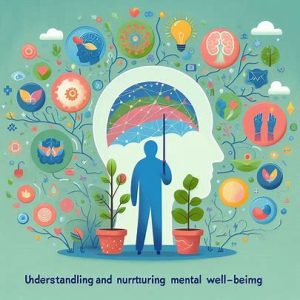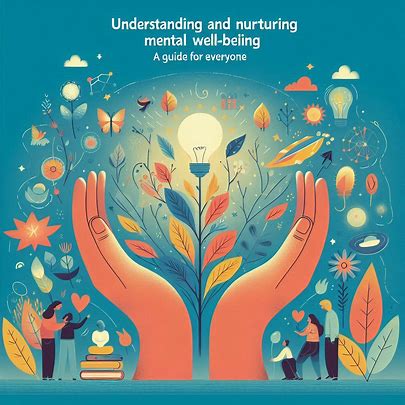Introduction
Mental well-being is the cornerstone of a fulfilling and balanced life. It encompasses our emotional, psychological, and social health, influencing how we think, feel, and interact with the world. In today’s fast-paced society, where stress, uncertainty, and digital overload are common, prioritizing mental well-being has become more critical than ever. The World Health Organization defines mental health as a state of well-being in which individuals realize their abilities, cope with life’s stresses, work productively, and contribute to their communities. This article explores the components of mental well-being, practical strategies to nurture it, and emerging trends shaping how we approach mental health in 2025. Whether you’re seeking to improve your own mental health or support others, this guide offers actionable insights for everyone.
The Foundations of Mental Well-being
What is Mental Well-being?
Mental well-being goes beyond the absence of mental illness. It involves feeling good about oneself, managing emotions effectively, and maintaining healthy relationships. It’s about resilience—the ability to bounce back from challenges—and finding purpose in daily life. For example, someone with strong mental well-being might face a job loss with optimism, seeking new opportunities rather than succumbing to despair.
Key Components
Mental well-being rests on several pillars:
- Emotional Health: The ability to process and express emotions in a balanced way. For instance, acknowledging sadness without letting it dominate your life.
- Psychological Health: A sense of purpose, self-acceptance, and personal growth. This might manifest as pursuing a hobby that brings joy or setting achievable goals.
- Social Health: Strong connections with family, friends, or community, providing a support network during tough times.
- Cognitive Health: Clear thinking, problem-solving, and maintaining focus, which can be supported by practices like mindfulness.
These components work together to create a holistic sense of well-being. Neglecting one can impact the others, like how social isolation might lead to emotional distress.
Why Mental Well-being Matters
Poor mental well-being can affect physical health, productivity, and relationships. Chronic stress, for example, is linked to heart disease, weakened immunity, and sleep disorders. In contrast, good mental health enhances life expectancy, improves workplace performance, and fosters stronger interpersonal bonds. A 2023 study from the American Psychological Association found that individuals with high mental well-being reported 30% lower rates of anxiety and depression, highlighting its protective effects.
In 2025, mental health is a global priority. The rise of hybrid work, social media pressures, and economic uncertainties has amplified the need for mental health awareness. Governments and organizations are investing in mental health programs, with initiatives like workplace wellness workshops and public campaigns promoting self-care.

Strategies to Nurture Mental Well-being
1. Practice Mindfulness and Meditation
Mindfulness involves staying present in the moment, reducing rumination on the past or worry about the future. Apps like Headspace and Calm, popular in 2025, offer guided meditations tailored to stress relief, sleep, or focus. For example, a 10-minute daily meditation practice can lower cortisol levels, as shown in a 2024 study from Harvard Medical School. Beginners can start by focusing on their breath for a few minutes each day, gradually building a routine.
2. Build Strong Social Connections
Humans are inherently social. Spending time with loved ones or joining community groups can combat loneliness. For instance, joining a local book club or volunteering can foster a sense of belonging. In 2025, virtual communities are thriving, with platforms like X hosting mental health support groups where people share experiences anonymously, creating safe spaces for connection.
3. Prioritize Physical Health
Physical and mental health are intertwined. Regular exercise, such as a 30-minute walk, releases endorphins, boosting mood. A balanced diet rich in omega-3 fatty acids (found in fish and nuts) supports brain health. Sleep is equally vital—7-8 hours nightly helps regulate emotions. For example, a 2025 trend involves wearable devices that track sleep patterns, helping users optimize rest for mental clarity.
4. Set Realistic Goals
Having a sense of purpose drives mental well-being. Set small, achievable goals, like learning a new skill or completing a project. For instance, someone might aim to cook a new recipe weekly, which builds confidence and creativity. The SMART goal framework (Specific, Measurable, Achievable, Relevant, Time-bound) is widely used in 2025 coaching programs to structure personal growth.
5. Seek Professional Support When Needed
Therapy and counseling are powerful tools. Cognitive Behavioral Therapy (CBT), for example, helps reframe negative thoughts, benefiting those with anxiety or depression. In 2025, teletherapy platforms like BetterHelp are mainstream, offering affordable access to licensed therapists. Stigma around seeking help has decreased, with public figures openly discussing therapy, encouraging others to follow suit.
6. Limit Digital Overload
Excessive screen time, especially on social media, can harm mental health. A 2024 study linked over three hours of daily social media use to increased anxiety in teens. Set boundaries, like no screens an hour before bed, and use tools like digital detox apps, which are trending in 2025, to monitor usage. Curating your social media feed to follow positive accounts, such as those promoting wellness on X, can also help.
Emerging Trends in Mental Well-being (2025)
Technology and Mental Health
Technology is revolutionizing mental health care. AI-powered chatbots, like those integrated into wellness apps, provide instant coping strategies for stress or panic attacks. Virtual reality (VR) therapy is gaining traction, allowing users to confront phobias in controlled environments. For example, VR exposure therapy helps individuals with social anxiety practice public speaking virtually.
Workplace Wellness Programs
Companies in 2025 are prioritizing employee mental health. Flexible work hours, mental health days, and in-office meditation sessions are common. Some organizations use AI tools to monitor employee well-being anonymously, offering resources like stress management workshops when needed.
Community-Based Initiatives
Grassroots movements are promoting mental health awareness. In 2025, community centers offer free mindfulness classes, and schools teach emotional regulation to children. Campaigns on platforms like X amplify these efforts, with hashtags like #MentalHealthMatters trending globally.
Challenges to Mental Well-being
Despite progress, barriers remain. Access to mental health care is uneven, particularly in rural areas. Financial constraints can limit therapy options, though free resources like online support groups help bridge the gap. Stigma, while reduced, persists in some cultures, deterring people from seeking help. Addressing these challenges requires collective action from governments, communities, and individuals.
Real-World Applications
Consider Sarah, a 30-year-old marketing professional. Overwhelmed by work and social media, she felt anxious and disconnected. By adopting a routine of morning yoga, limiting screen time, and joining a local hiking group, she rebuilt her mental well-being. Similarly, schools implementing mindfulness programs report fewer behavioral issues, showing how early intervention fosters resilience.
Conclusion
Mental well-being is a lifelong journey, not a destination. By understanding its components and adopting practical strategies like mindfulness, social connection, and professional support, anyone can enhance their mental health. In 2025, technology and community initiatives are making mental well-being more accessible, but personal commitment is key. Start small—try a five-minute meditation or a walk with a friend—and build from there. Your mind is your greatest asset; nurturing it ensures a healthier, happier life. If you’re struggling, reach out to a trusted friend or professional. You’re not alone, and every step toward mental well-being counts.




